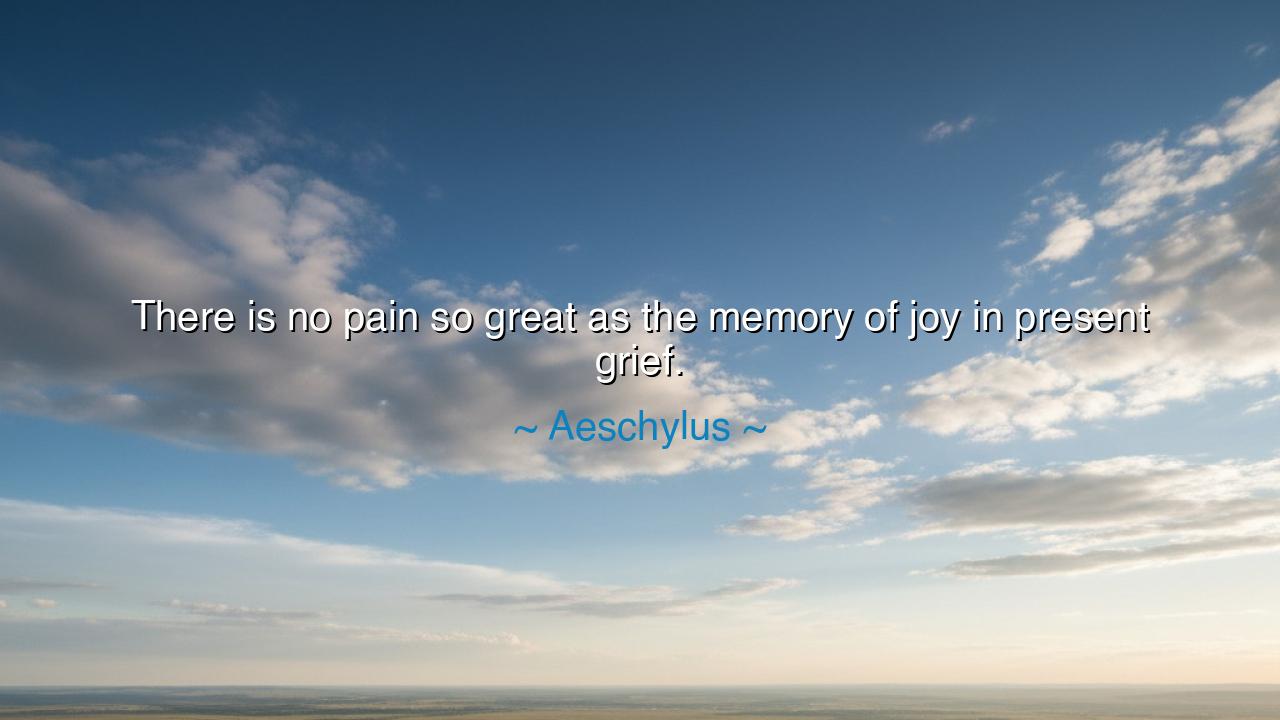
There is no pain so great as the memory of joy in present grief.






Hearken, O seekers of wisdom, to the somber words of Aeschylus, who proclaimed: “There is no pain so great as the memory of joy in present grief.” In these lines lies a profound meditation upon loss, memory, and the human heart’s capacity to suffer through the contrast of past happiness and present sorrow. Aeschylus, the tragedian of antiquity, illuminates the paradox of remembrance: that the sweetness of former joy, recalled amid the shadow of grief, sharpens the edge of sorrow, making it keen and inescapable.
From the earliest civilizations, philosophers and poets recognized the duality of human experience. In the epics of Homer, warriors who survived battles yet lost comrades carried with them the memory of camaraderie and festivity, and it was this remembrance that amplified their mourning. Aeschylus’ reflection mirrors this eternal truth: the heart remembers what was once beloved, and the recollection of delight, when paired with current suffering, magnifies the anguish of the moment.
The words also illuminate the interwoven nature of joy and grief. To have known happiness is both a blessing and a burden; the memory of laughter, love, or triumph becomes a lens through which one perceives present hardship. Consider the tale of Antigone, who mourns her brothers and suffers amid familial strife. Her remembrance of moments of familial closeness intensifies her grief, yet also underscores the depth of her love and devotion. Aeschylus teaches that memory is a double-edged sword, revealing both the richness of life and the sharpness of loss.
Even in history, the truth of this observation is evident. Abraham Lincoln, who bore the weight of a nation during civil war, grieved deeply for his son Willie, who had passed. The memory of his son’s joy, laughter, and presence intensified his sorrow, even as he labored to lead and console others. The pain of memory, Aeschylus reminds us, is a natural and inescapable companion of profound love and attachment.
Yet within this sorrow lies a subtle lesson: the intensity of grief reflects the depth of past joy. The sharper the memory, the greater the capacity of the human heart to experience life fully. In acknowledging this, one may find meaning: suffering is entwined with the very experiences that have made life rich. To feel the pain of remembered joy is to bear witness to the value and significance of what was once treasured.
From this reflection emerges a timeless teaching: allow grief to coexist with memory, and recognize that sorrow is amplified by the beauty it contrasts. Rather than attempting to suppress or deny past joy, one should embrace the full spectrum of experience, knowing that the depth of present suffering is a mirror of the heart’s capacity for love and delight.
Practical counsel flows naturally: when faced with grief, reflect upon the joys that preceded it, not as a source of torment, but as testament to a life lived richly. Honor memories, share stories, and allow remembrance to shape resilience and gratitude. In doing so, one transforms the anguish of memory into a noble testament to the beauty and depth of human experience.
Thus, O listener, let the words of Aeschylus illuminate your understanding: the memory of joy, recalled in sorrow, is a pain unmatched, yet it is also the mark of a heart that has truly loved and known life. Embrace both grief and remembrance, for the coexistence of pain and joy is the essence of our humanity. In this, one learns that the intensity of suffering reveals the profundity of life itself, and that memory, even when painful, is a treasure to be honored.






AAdministratorAdministrator
Welcome, honored guests. Please leave a comment, we will respond soon